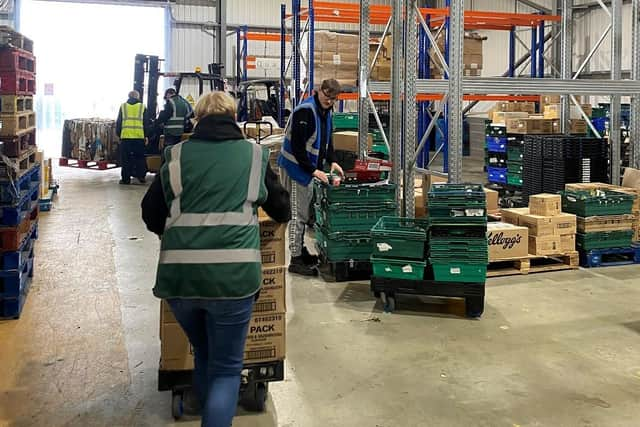FareShare Hull and Humber: Yorkshire food charity future at risk as it sees ‘lowest amount of food in 12 months’ and ‘tremendous’ rise in food poverty
FareShare Hull and Humber is part of the FareShare UK network, managed by the Goodwin Development Trust.
The charity’s struggles have been attributed to a variety of factors including the aftermath of Brexit and a rising cost of living.
Advertisement
Hide AdAdvertisement
Hide AdThe goal of the charity is to save food from going to landfill and redirect it to community groups and charities across Yorkshire; it covers Hull, East Riding of Yorkshire, parts of North Yorkshire, North East Lincolnshire and North Lincolnshire.


The business currently helps more than 145 charities and community groups who support around 20,000 people every week facing food poverty or insecurity.
There are currently 13 million people in the UK who are facing food insecurity, with one in five people worried about where their next meal will come from, the charity said, whilst tonnes of surplus food goes to landfill.
Assistant operations manager at FareShare Hull and Humber, Jodie Colgrave, told The Yorkshire Post the charity’s mission is to reduce the number of food going to waste by redirecting surplus stock and re-routing it to charities and community groups across the region.
Advertisement
Hide AdAdvertisement
Hide AdHowever, Ms Colgrave said the food redistribution charity continues to see a decrease in stock in recent months amid the cost of living crisis.
“In April 2023 we received and redistributed 53 tonnes of food, which is down by 13 tonnes from the previous month”, Ms Colgrave explained.
“It is also the lowest amount of food we have seen in 12 months. If we continue to see a decrease in stock we won’t be able to continue as we are.
“There are a variety of reasons that are reducing food volumes - supermarkets can keep food on the shelves longer, the impact of Brexit and the rising cost of living meaning less food is being purchased so less food is being stocked, leading to less surplus.”
Advertisement
Hide AdAdvertisement
Hide AdMs Colgrave has also warned there has been a significant increase in people accessing the services of the charity as a result of the rising cost of food in supermarkets.
“At the end of 2022, our Community Food Members have seen up to 60% increase already in people accessing their services for support with food. This has continued to rise through 2023 in line with the rising cost of food in supermarkets,” Ms Colgrave said.
“We need more food coming into the depot. The rise in food poverty and food insecurity has risen tremendously, and we simply can’t match demand as it stands.
“We are looking for local food businesses to work with us and donate their surplus food so that we can continue to support our members and other groups who are waiting to come on board.
“We are committed to supporting our members and the people living in our region.
“We will continue working hard to source more food.”
Comment Guidelines
National World encourages reader discussion on our stories. User feedback, insights and back-and-forth exchanges add a rich layer of context to reporting. Please review our Community Guidelines before commenting.
